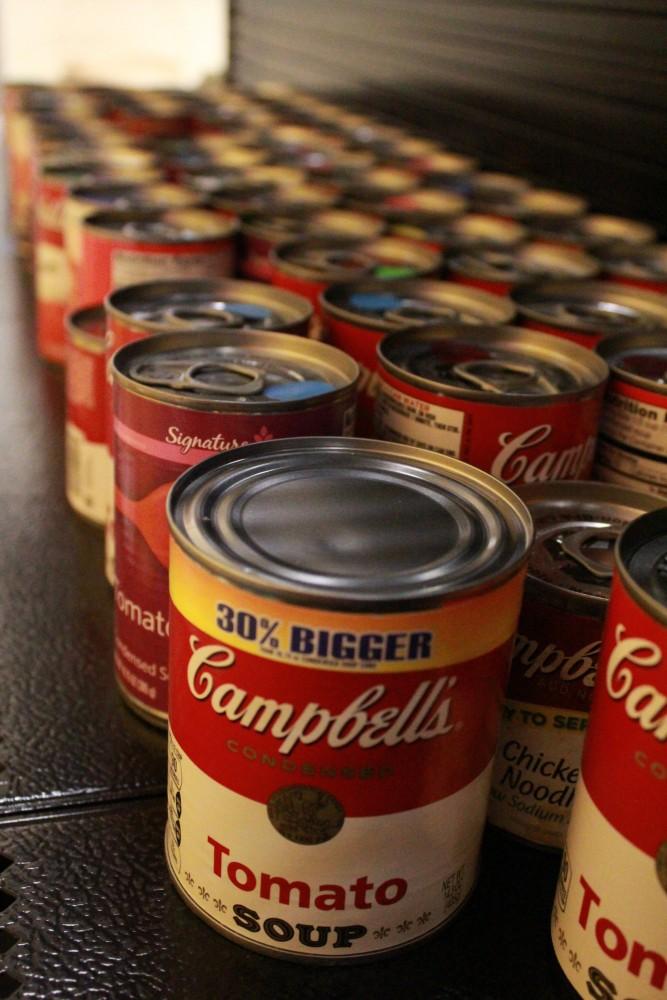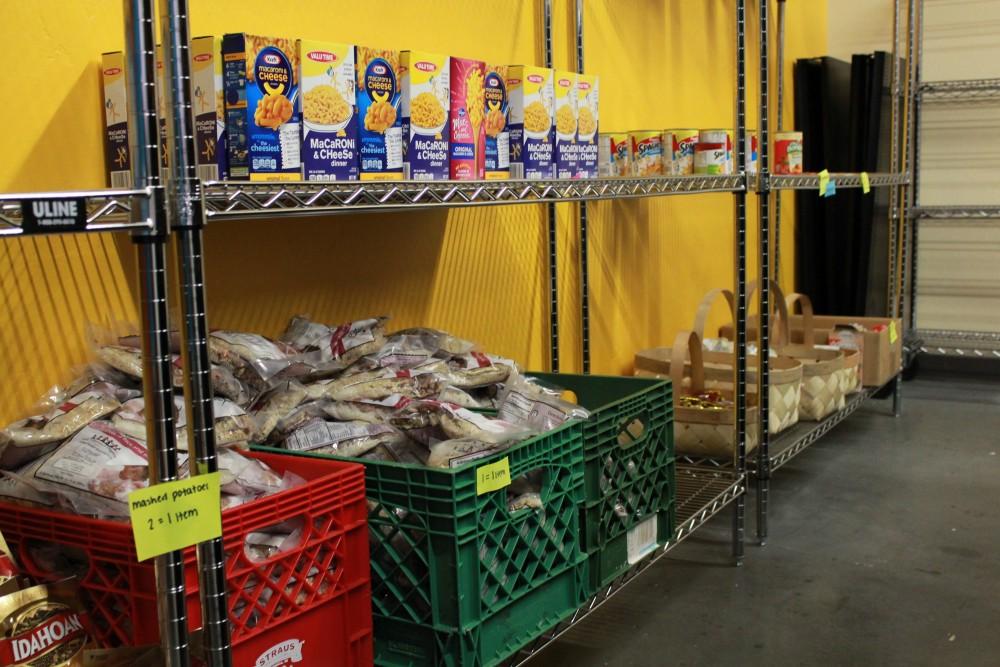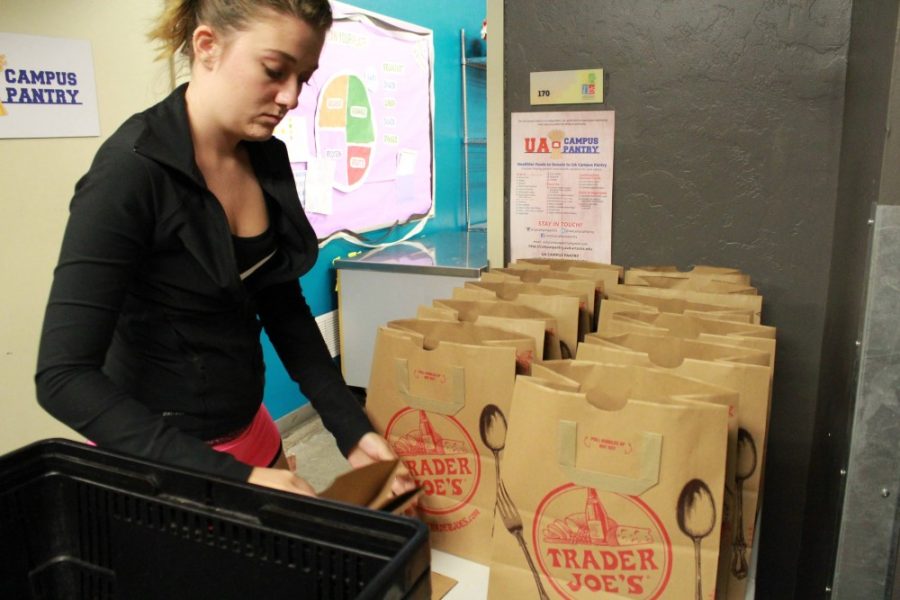The University of Arizona has several programs that aim to help the campus community and support those who are dealing with food insecurities.
Food insecurity is defined as not being able to provide or possibly afford food for oneself. Being that it is hard to grow produce in Tucson, programs that focus on fighting this insecurity are becoming more relevant and important, according to Michaela Davenport, the executive director of Campus Pantry.
Campus Pantry is one of the programs that helps campus members fight food insecurity. The program is run out of the Student Union Memorial Center and is overseen by the Associated Students of the University of Arizona.
RELATED: Student Unions’ plantED Culinary Worshop series returns
The program acts as a support system to students, faculty and staff who find themselves unable to buy basic food items or a meal, according to Davenport. She works with a team of students and one graduate student to help operate the pantry.
“We help students get over the next hurdle,” Davenport said. “Hoping to help students be as successful as they can be in school and help them have access to food when they need it.”
Campus Pantry runs their operation as a cross between a food bank and grocery store, Davenport said. Anyone with a valid CatCard is welcome to the pantry and are able pick out up to four items to take home.

According to Davenport, if students, faculty or staff bring their own bag, in efforts to be more sustainable, they can receive a fifth item
Non-perishable canned items, bread and milk are among the most popular items that students can receive at the pantry.
“[We are] working to provide supplemental food assistance to students, faculty and staff on campus,” Davenport said.
The community can come to Campus Pantry distribution days on Wednesdays and Fridays to receive pantry items.
The pantry is also involved in other events besides their distribution of food to the campus community. There are fundraising events and yearly benefit dinners with silent auctions and speakers who come participate in the event, according to Davenport.
Boxing Up Hunger is another event that ASUA puts together through Campus Pantry. The idea of this event is to take extra food that was originally provided at meetings and events in the many ballrooms within the SUMC and distribute that food to students, staff and faculty in need. It’s a way to be sustainable and limit food waste, according to Davenport.
Campus Pantry receives donations and works with a variety of organizations on campus, including several UA sororities and fraternities.
RELATED: The Green Career Mixer returns to campus
“There’s still a really big need from our community for a resource like the Campus Pantry and so we want to make sure that all the students who need it are able to have access,” Davenport said.
The sorority Alpha Epsilon Phi, along with other Greek chapters at UA, recently participated in a fundraiser to raise as much food donations as possible within a two-week period to then give back to the community and to Campus Pantry, according to Sarah Rose, the president of Alpha Epsilon Phi.
“Those who normally get food from Campus Pantry are our peers and faculty at the UA, so it’s kind of close to home,” Rose said.
Greek Life raised donations and awareness to food insecurity among their peers and faculty, according to Rose.
“People help [Alpha Epsilon Phi sorority], so we have to give back to the community,” Rose said.
Canned items, pastas and sauces were donated by the UA sororities and fraternities, helping people who may receive those donations to be able to cook different meals, according to Rose.
“I think [the experience] kind of opened my eyes and opened members’ eyes to what’s really going on on our campus and how students and faculty are struggling to feed themselves,” Rose said. “It makes me want to keep donating and fundraising for Campus Pantry.”

Another ASUA group working on alleviating food insecurity is Students for Sustainability. Within SFS, there is a committee dedicated to serving and providing the student body and community with fresh produce and food, called Food For All.
The purpose of the program is to be able to provide fresh food for the UA community, according to their mission statement.
One of the outside programs that Food For All works with closely and brings to campus is Market On The Move, part of The 3000 Club in the 2016-2017 year. The 3000 Club is a non-profit, charitable organization that works with food banks around Arizona.
Market On The Move works with Food For All to provide fresh produce at a cheap price. Students, faculty or staff can buy produce bundles for a low cost.
By having Market On The Move come to campus, the produce is cheaper and the UA community has easy access to the fresh food, according to Nicole Guertler, the Students for Sustainability and Food For All co-chair.
Students for Sustainability and their committee, Food For All, work to educate the public and the student community about food deserts, and bringing resources, such as fresh produce and fresh food, closer to the people who may need it, according to Guertler.
“[Food insecurity], it does go hand in hand with food deserts,” Guertler said.
RELATED: Unplugged and Raw: A concert by students, for students
Market On The Move has helped the community and students by providing fresh produce for cheaper prices than the grocery store or on-campus stores, according to Guertler.
“We would get a lot of those customers coming back, which was really great, because every time they came back they would always be like ‘We are so grateful that you are here, we’re so grateful that you’re doing this’,” Guertler said.
Community members and students have come back continuously to Market On The Move and bought produce, further supporting Market On The Move and Food For All, according to Guerlter.
“Definitely, I can tell that we are making an impact,” Guertler said.
Food insecurity and food sustainability programs are available to students, faculty and staff, often located right in the Student Union Memorial Center or in the surrounding buildings.
Follow Briannon Wilfong on Twitter









